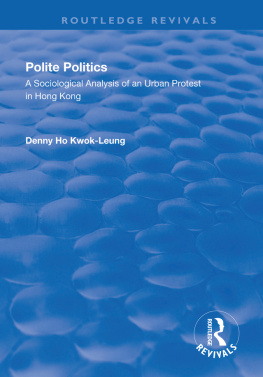
Hong Kongs Global Financial Centre and Chinas Development
This book provides an overview of Hong Kongs role as an international financial center, focusing especially on how Hong Kong has contributed significantly, and continues to contribute significantly, to Chinas economic development. It considers the importance of Hong Kongs stock market in raising finance for Chinese companies, explores the potential of Hong Kong as an offshore financial center, and discusses recent regulatory reforms. It concludes by assessing the prospects for Hong Kongs continuing success as a global financial center, and puts forward recommendations for policies which would help secure continuing success.
Yan-leung Cheung is President and Professor of Public Policy at Education University of Hong Kong.
Yuk-shing Cheng is Head and Associate Professor in the Department of Economics at Hong Kong Baptist University.
Chi-keung Woo is Professor in the Department of Asian and Policy Studies at Education University of Hong Kong.
Comparative Development and Policy in Asia Series
Series Editors Ka Ho Mok (Hong Kong Institute of Education, China)
Rachel Murphy (Oxford University, UK)
Misa Izuhara (University of Bristol, UK)
For a full list of titles in this series, please visit www.routledge.com
11Chinas Civil Service Reform
Wang Xiaoqi
12Towards a New Development Paradigm in Twenty-First Century China
Economy, society and politics
Edited by Eric Florence and Pierre Defraigne
13Public Policymaking in Hong Kong
Civic engagement and state-society relations in a semi-democracy
Eliza W. Y. Lee, Elaine Y. M. Chan, Joseph C. W. Chan, Peter T. Y. Cheung, Wai Fung Lam and Wai Man Lam
14Nations, National Narratives and Communities in the Asia-Pacific
Edited by Norman Vasu, Yolanda Chin and Kam-yee Law
15The Changing Policy-Making Process in Greater China
Case research from Mainland China, Taiwan and Hong Kong
Edited by Bennis Wai Yip So and Yuang-kuang Kao
16Chinas Social Policy
Transformation and challenges
Edited by Kinglun Ngok & Chak Kwan Chan
17New Life Courses, Social Risks and Social Policy in East Asia
Edited by Raymond K H Chan, Jens O Zinn, and Lih-rong Wang
18Trends in Chinese Education
Edited by Hongjie Chen and W. James Jacob
19Hong Kongs Global Financial Centre and Chinas Development
Changing roles and future prospects
Yan-leung Cheung, Yuk-shing Cheng and Chi-keung Woo
Hong Kongs Global Financial Centre and Chinas Development
Changing roles and future prospects
Yan-leung Cheung, Yuk-shing Cheng and Chi-keung Woo
First published 2017
by Routledge
2 Park Square, Milton Park, Abingdon, Oxon OX14 4RN
and by Routledge
711 Third Avenue, New York, NY 10017
Routledge is an imprint of the Taylor & Francis Group, an informa business
2017 Yan-leung Cheung, Yuk-shing Cheng and Chi-keung Woo
The right of Yan-leung Cheung, Yuk-shing Cheng and Chi-keung Woo to be identified as authors of this work has been asserted by them in accordance with sections 77 and 78 of the Copyright, Designs and Patents Act 1988.
All rights reserved. No part of this book may be reprinted or reproduced or utilised in any form or by any electronic, mechanical, or other means, now known or hereafter invented, including photocopying and recording, or in any information storage or retrieval system, without permission in writing from the publishers.
Trademark notice: Product or corporate names may be trademarks or registered trademarks, and are used only for identification and explanation without intent to infringe.
British Library Cataloguing in Publication Data
A catalogue record for this book is available from the British Library
Library of Congress Cataloging in Publication Data
A catalog record for this book has been requested
ISBN: 978-1-138-18765-8 (hbk)
ISBN: 978-1-315-64302-1 (ebk)
Typeset in Times New Roman
by Apex CoVantage, LLC
Contents
This book, by Yan-leung Cheung, Yuk-shing Cheng and Chi-keung Woo, fills an important void in the literature on Hong Kong as an international financial centre and Mainland Chinas highly successful economic reform and opening to the world beginning in 1978. It takes a comprehensive look at the role of Hong Kong in the financing of the development and reform of the Mainland economy and its active participation in the world economy. The financial institutions in Hong Kong provided the crucial services necessary to support the international trade and direct and portfolio investment, first in-bound and more recently out-bound, of the Mainland. They were also responsible for the bulk of the offshore capital- and debt-raising by Mainland enterprises and institutions.
The authors also compare Hong Kong with other international financial centres, such as New York and London, making use of the various rankings compiled by different parties. They also identify the Renminbi business as the most important growth area for Hong Kong, which has a unique comparative advantage relative to the other offshore financial centres. However, the profitability and potential scale of the offshore Renminbi business depends on the continued existence of capital controls, interest rate differentials, and the stringency of financial regulations. For example, the Euro Dollar market developed in London in part to facilitate the avoidance of the more onerous U.S. regulations and taxes. The Mainlands need for the inflow of foreign capital will be declining over time as it is an economy with significant surplus savings. Its need for foreign exchange will also be declining as the Renminbi becomes used more and more as a medium of world payments. Hong Kong should begin to focus on how it can help to redeploy the surplus savings from the Mainland to the rest of the world and try to achieve a division of labour with Shanghai. The Mainland economy is certainly large enough to support two or even more international financial centres.
In addition to market-based data, the authors have also collected and analysed very valuable survey data from the market participants, including local and foreign enterprises as well as enterprises from the Mainland, that reveal their different expectations, intentions and concerns. They are right to point out that a pro-active government is necessary in order to lower the cost of doing business in Hong Kong, to collaborate with Hong Kongs competitors on the Mainland, and to maintain political and social stability so essential to Hong Kongs continued prosperity.
This book should be read by everyone who is interested in Hong Kong as an international financial centre and in the future evolution of the Renminbi.
Lawrence J. Lau
Ralph and Claire Landau Professor of Economics
Lau Chor Tak Institute of Global Economics and Finance
The Chinese University of Hong Kong
November 2016
Hong Kong
This book originates from The Role of Hong Kongs Financial Center in Chinas Development, a Strategic Public Policy Research (SPPR) project undertaken during 201114 and funded by the Research Grants Council (RGC) of the Government of the Hong Kong Special Administrative Region (HKSAR).







